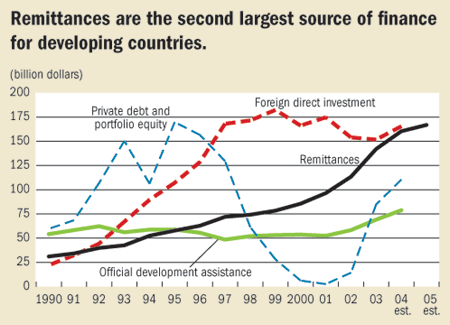Africa has a gross diaspora population most of whom are found in Europe and America. According to the World Bank's Send Money Africa report, in 2012, the African diaspora remitted back home $60 billion. This represented an important addition to the gross domestic product of many African states like Nigeria and South Africa.
It is however sad that Sub-Saharan Africa was the most expensive region to send money to, with average remittance fees reaching 12.4%. This view is shared by a February editorial by African Executive. This is almost 12% more than the global average of 8.96% and nearly twice the cost of remitting money to South Asia, which had the world's lowest prices at about 6.54%. Further, the remittance fees were even higher between African states.
Tariff and non-tariff barriers continue to hamper the progress and development of African states. Protectionism, tariffs and non-tariff barriers within Africa encourage African markets to be tilted towards former colonizers.
The World Bank, the International Monetary Fund (IMF), the African Union, the African Development Bank as well as African states have not done much to facilitate efficiency in cash flow, goods and services into and out of the continent. The inertia by international and regional bodies as well as states also contributes to food insecurity, poor healthcare, and conflicts. Why should a continent so blessed with human resources and viable financial institutions remain at the mercy of institutions like the World Bank and the IMF to determine charges for money to be remitted to Africa? Is this not another way of making Africa poor and underdeveloped?
Eradicating unnecessary tariff and non-tariff barriers will make African entrepreneurs important players in the global trade system. This will thus make the process of transferring money to the continent easier, cheaper and secure, as this will translate to more investment and business opportunities. If international institutions like the World Bank and the IMF care much about Africans, then there is need to work hand in glove with African institutions and states to curb this exorbitant charges.
There is also much talk about the BRICs Bank, an initiative which is spearheaded by Brazil, India, China and South Africa. Many financial analysts are hoping that the BRICs Bank will grossly alleviate the poverty of Africans and contribute to the continent’s development. All the same, this view is not shared by all financial analysts and economists. Pessimists argue that the BRICs Bank will instead make things worse. Some of them even fear that remittance fees for African diaspora sending money to the continent may even double.
In as much as concerns remain with respect to remitting money to Africa, Africans in the diaspora need to remain optimistic. There is need for Africans in the diaspora to continue to cry foul via the social media, the press and television networks. The World Bank and IMF have done more harm than good to the African continent. This process has been facilitated by weak central governments of African states that continue to bow to programmes and policies that have continued to impoverish the continent. The continent needs a renaissance which can partly be achieved if remittance fees for African diaspora sending money home are reduced.
Chofor Che is an associate of AfricanLiberty.org and an integral part of the Voice of Liberty initiative. He is also a Doctoral Law candidate at the Community Law Centre, University of the Western Cape and blogs at http://choforche.wordpress.com/ .



